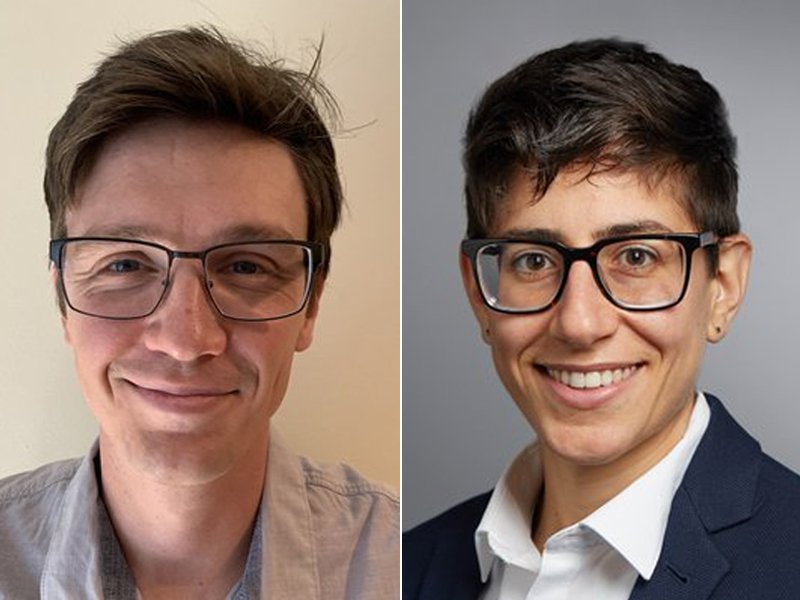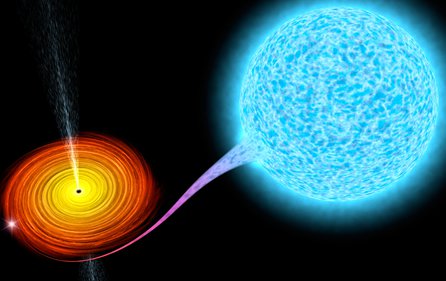Two A&S Professors Receive Powe Junior Faculty Enhancement Awards
The awards will support physicist Eric Coughlin’s astrophysical research into deep tidal disruptions and psychologist Jillian Scheer’s work with at-risk LGBTQ populations.

Two professors in Syracuse University’s College of Arts and Sciences were among 41 researchers from around the country selected as recipients of 2022-23 Ralph E. Powe Junior Faculty Enhancement Awards from the Oak Ridge Associated Universities (ORAU). Eric Coughlin, assistant professor of physics, and Jillian Scheer, the Cobb-Jones Professor of Clinical Psychology, each received grants of $5,000, matched by the College of Arts and Sciences and the University’s Office of Research, making the total prize worth $10,000.
According to Alan Middleton, A&S associate dean of research and scholarship, the Powe Awards, coupled with an A&S record five Faculty Early Career Development Program (CAREER) awards from the National Science Foundation, affirm the research prowess newer faculty in the College are already showing.
“Professors Scheer and Coughlin have started their careers here with speed and energy. They have immediately brought research grant funding to Syracuse while starting initiatives in teaching and mentoring students,” says Middleton.
The Powe Awards, named for Ralph E. Powe, who served as the ORAU councilor from Mississippi State University for 16 years, provides funds to enrich the research and professional growth of young faculty. Now in their 32nd year, 840 grants have been awarded totaling more than $4 million. Syracuse University’s most recent Powe Awards winners were Davoud Mozhdehi, assistant professor of chemistry and Yeqing Wang, assistant professor of mechanical and aerospace engineering in the College of Engineering and Computer Science, who each received the honor in 2020-21.
Exploring Stars Destroyed by Supermassive Black Holes

Similar to how the moon’s gravitational forces on the Earth create ocean tides, the gravitational field of a supermassive black hole can also affect nearby stars. But unlike the moon’s relatively weak gravitational pull on the Earth, which causes a slight rise and fall in sea level, black holes generate enough gravitational force to “crush” a star when it gets too close, compressing it into a small fraction of its original volume.
With his Powe award, physics Professor Eric Coughlin will employ a combination of analytical modeling and numerical experiments to explore whether the compression experienced by a star during one of these "deep" tidal encounters can cause a thermonuclear detonation and a peculiar explosion.
Coughlin says newer work suggests that compressive effects on a star may not be as strong as earlier models proposed, but if the star comes close enough to the black hole, it may still be possible to detonate it with tides. He and his colleagues have written extensively on the topic of stars being crushed by black holes, with three articles published over the past six months:
- Stars Crushed by Black Holes. I. On the Energy Distribution of Stellar Debris in Tidal Disruption Events;
- Stars Crushed by Black Holes. II. A Physical Model of Adiabatic Compression and Shock Formation in Tidal Disruption Events; and
- Stellar Revival and Repeated Flares in Deeply Plunging Tidal Disruption Events.
Coughlin, who started at Syracuse in 2020, says this work takes on great importance as over the next decade there will be an enormous increase in both the number and type of “astrophysical transients” detected, which are rapidly rising and fading sources of light in the night sky.
“This modeling will enable us to extract understanding from some of the most extreme and peculiar transients,” he says. “It will also directly probe the inner regions of distant galaxies and the existence of supermassive black holes, which are among the more mysterious predictions of Einstein’s general theory of relativity.”
Helping At-Risk Populations Through Writing Intervention
Research has found that sexual minority women (SMW; e.g., lesbian, bisexual, or queer) who have encountered unique stressors, such as stigma and trauma, are at an increased risk of suffering from mental health conditions including posttraumatic stress disorder (PTSD) and are more susceptible to hazardous drinking – alcohol use that increases the risk of negative consequences. Psychology Professor Jillian Scheer will use the Powe funding to refine and test writing interventions designed to help reduce PTSD symptoms and hazardous drinking in SMW who have experienced trauma.
Scheer and collaborators will adapt existing evidence-based writing protocols to understand whether tailored expressive writing interventions (i.e., writing about stigma or trauma) lead to decreased PTSD and hazardous drinking, as compared to daily neutral journaling (i.e., active control condition).
Over 200 trauma-exposed SMW participants from across the U.S. will be randomly assigned to participate in a 3-5 session stigma writing intervention, trauma writing intervention, or neutral control. Three months following the last writing prompt, Scheer and colleagues will examine whether the stigma and trauma expressive writing interventions exert significant improvements in PTSD symptoms and hazardous drinking compared to daily neutral journaling.
“Findings from this research will increase the clinical relevance of personalized technology-delivered treatments and inform studies using computational text analysis to guide ‘low-threshold treatments,’ which address barriers to care for SMW such as anticipated stigma and accessibility issues,” explains Scheer.
The automated text analysis program the team will use examines language usage as a predictor of treatment outcomes.
“Specifically, we will measure language categories, for example, cognitive and emotion processing words such as ‘cause’ or ‘feel,’ and assess whether language use differs between the trauma-related expressive writing condition and control and between the stigma-related expressive writing condition and control,” Scheer says.
The project will provide essential data for a National Institutes of Health R01 proposal to conduct a fully powered randomized controlled trial and prepare for dissemination of evidence-based, accessible, expressive writing treatments for at-risk SMW.
Scheer, a faculty member in the A&S psychology department since 2020, is director of the Minority Stress and Trauma (MST) Lab. The MST lab’s research is focused on bettering the mental and behavioral health of diverse and underserved sexual and gender minority people who have experienced trauma. In addition to the Powe award, Scheer was recently the recipient of a prestigious K01 grant from the National Institute on Alcohol Abuse and Alcoholism (NIAAA) for their project, “Testing a biopsychosocial model of violence exposure, minority stressors and hazardous drinking among sexual minority women,” which will help screen at-risk sexual minority women for services and differentiate treatment needs.
About Oak Ridge Associated Universities:
ORAU provides innovative scientific and technical solutions to advance national priorities in science, education, security and health. Through specialized teams of experts, unique laboratory capabilities and access to a consortium of more than 150 colleges and universities, ORAU works with federal, state, local and commercial customers to advance national priorities and serve the public interest.
Featured
Eric Coughlin Assistant Professor
Jillian Scheer Assistant Professor, Cobb-Jones Professor of Clinical Psychology
